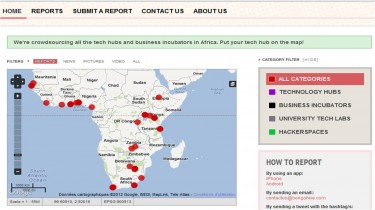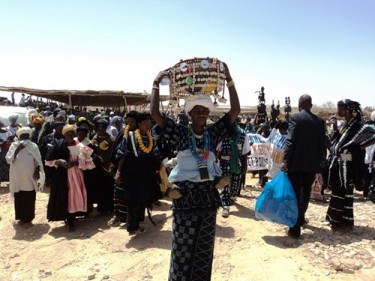To illustrate the technological transformation that the African continent is undergoing, CNN's African Voices [1] has highlighted 10 leading tech voices [2] from different African countries. While the article put a much needed emphasis on the innovation trend originating from the African continent and their achievements, many tech experts felt that the feature did not represent the whole scope of tech innovation and entrepreneurship that is brewing in all the regions of the continent. It left out most of the non-English speaking regions and outreach actions that took place in the most isolated areas from a technological standpoint.
Innovation from Necessity
Bright B Simmons [4], the Accra-based founder of mPedigree Network [5] explains “What Africa's Entrepreneurs Can Teach the World” [6]:
It's becoming ever clearer that entrepreneurship is the answer to the vexing economic questions facing Africa today (..) But how has it actually evolved in Africa? Are there peculiar features of African entrepreneurship we may consider relevant to big global debates on development and sustainability? [..] the overall difference in the structure of typical African economies, compared to the West, makes a big difference. The fewer resources available to regulatory and tax authorities and the smaller sizes of businesses jointly mean that when businesses make complex arrangements to rationalize their tax expenditures, their costs go up rather than down. Also, a shallower financial system makes the notion of a corporate treasury function similar to what is common in the West nearly redundant in the African setting.[..] In a sense, African entrepreneurs run profit ecosystems rather than business units. These ecosystems interact with other ecosystems in a culturally elaborate manner that can produce extreme robustness, resilience, and flexibility.
In Senegal, entrepreneurs have clearly identified the need for better networking between actors in the field of agriculture ( and other industries). A Start Up conference is set up on March 30 in Dakar to discuss opportunities in collaboration between tech experts and entrepreneurs [7] [fr] :
Le constat est simple : trop peu de liens sont encore tissés entre les TIC et les secteurs dans lesquelles elles pourraient avoir des retombées sociales et économiques considérables. Les jeunes développeurs ne savent généralement pas comment utiliser leur talent au profit de ces industries et de l’autre côté, les professionnels des secteurs concernés ne sont pas en contact avec le monde des TIC et du fait peinent à exprimer leur problématiques en termes techniques.
In the CNN African Voices feature, Ory Okolloh emphasizes why technology is important but that other critical areas need to evolve as well [2] for the effort to persevere:
In order for this growth to be sustainable and to create more revenue generating opportunities, we need other forms of infrastructure such as electricity to catch up and we need more governments to embrace the idea of open access policies
An indication of the current innovation trends that are bubbling on the continent is the multiplication of technology hubs across the continent [8] (via Crowdmap):
A recent example of collaborative tech initiative through the aforementioned hubs is the Apps4Africa event on Climate Change [9] that i-Hub tech community in Madagascar is organizing on March 16.
The Language Divide
Okolloh noticed along with other tech African experts [10]that other regions were missing from the coverage. Jean Patrick Ehouman explains both his satisfaction with seeing African tech being in the news and his disappointment with the lack of coverage of the francophone tech world [11] [fr] :
Il y a 21 pays en Afrique (environ 350 millions de personnes) dont la langue officielle est le Français. En plus de ces 21 pays, il y a 5 autres dont le Français est aussi une langue officielle (la deuxième). Il s’agit de l’Algérie, le Maroc, la Mauritanie et la Tunisie qui sont des pays dont la première langue officielle est l’Arabe. Dans tous ces pays, il y existes des passionnés et des leaders de technologies qui publient régulièrement sur Twitter. Ces personnes passent beaucoup de temps à créer ou a mobiliser les différents acteurs de cette industrie pour en tirer le meilleur. [..] @Fasokan n’a jamais réussi à lever des centaines de millions de dollar pour ces projets, mais il a beaucoup de mérite quand on sait que grâce à lui les villageois des zones reculées du Mali arrivent à se faire connaitre du monde en tenant un blog [12]. Et il publie tant en Bambara (Langue africaine parlée au Sénégal, en Mauritanie, au Mali, au Burkina Faso, en Côte d’Ivoire, en Guinée, …) qu’en français. Combien de blogueurs connaissez qui ont réussi l’exploit de dynamiser l’une des langues les plus parler sur le continent ?
Lusophone Africa was also left out of the conversation on tech in Africa which did not sit well with GiantPanda. She writes on Menina do Javali [14]:
This has been a pet peeve of mine for a while: the laziness of the international media in relation to the (post-) colonial tower of babel. Articles in English about “Africa” suffer from the “Africa is a Country” lens, but I would go further and say it’s “Africa is a Country That Speaks English” lens [..] Just as Jean Patrick Ehouman suggests in his post in French, let’s start a thread here below assembling the best tweets (in Lusophone Africa)…
The Challenges
Nigerian Ndubuisi Ekekwe [15], founder of the non-profit African Institution of Technology, highlights the challenge of raising investment funds in developing countries [16] and the importance of making African tech business ventures easier to grasp for investors :
Entrepreneurs need to have plans in place for investors to exit, especially in developing countries. Most investors don't have years to wait around to recoup investments through growth and profits. Most are gone after about four to eight years, and entrepreneurs need to present a clear path for that to happen.
Malagasy tech blogger Tsiory Razafimanantsoa highlights another challenge that plagues the tech world in Africa : the proliferation of online scams [17] [fr] that undermines the trust that investors require for a sustainable business atmosphere [fr]:
(A Madagascar,) Aujourd’hui, l’actualité porte sur la hausse des prix de communications mobile, le mauvais temps, la connexion internet capricieuse… Mais au milieu de tout ce foutoir, il y a une autre “crise” grandissante: l’arnaque pyramidale. [..] Il n’y a pas encore de texte dans la loi malgache qui condamne une telle pratique. En effet, surement déjà pratiquée à petite échelle avant, elle ne gagne du terrain que depuis quelques mois.
In conclusion, despite tangible challenges, tech in Africa is bound for a major leap forward. As Julia Rotich states [2] :
The narrative about Africa is changing every single day, driven with the opportunity in a continent of more than 300 million middle class Africans. [..] The promise here is that the entrepreneurial drive we see in young technologists will translate to more African solutions to African problems, and thereby African prosperity. Challenges abound of course, but indications in innovation hubs like Kenya point to a lot of promise and a very different narrative in the coming years.


